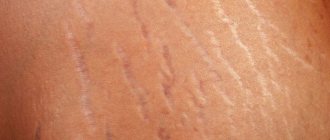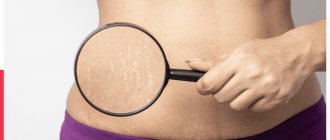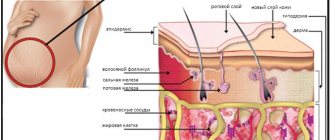From this article you will learn:
- Causes of weight gain during pregnancy
- Motivation for weight loss after childbirth
- When can you start losing weight after giving birth?
- How many calories do you need to lose weight after pregnancy?
- 9 rules for weight correction after childbirth
- Exercises for weight loss after childbirth
- Ways to lose weight that you shouldn't resort to
Weight correction after childbirth is one of the most important tasks of a new mother. Of course, a baby requires a lot of strength and attention, but you shouldn’t forget about your appearance and health. New responsibilities, taking care of the baby, changing your daily routine - all this can be used to get rid of extra pounds.
You should approach the issue of losing weight responsibly, because the well-being of the new family member depends on your health, mood and condition. We will tell you what you can do and what weight loss methods you should avoid in this article.
Causes of weight gain during pregnancy
Most women who have children remember their condition after childbirth and the desire to quickly return to their previous forms.
A swollen belly irritates you, and your mood spoils when you look at your plump thighs, which won’t fit your favorite jeans. Well, the “orange peel” on the legs and buttocks completely sweeps away dreams of a new swimsuit and the desire to wear the usual miniskirt. It is especially difficult to correct weight after childbirth after the second and third child, if you do not know the reasons for this condition. Most often, hormonal imbalance, which occurs due to a number of factors, prevents you from losing excess weight. This:
- inactive lifestyle;
- unusual daily routine, adjusted to the feeding of the baby;
- poor nutrition leading to indigestion;
- postpartum depression with excessive appetite and constant overeating;
- too much weight gained during pregnancy;
- late gestosis with postpartum swelling;
- exacerbation of chronic diseases.
Strict diets for a nursing mother are contraindicated, but even if the child is bottle-fed, a balanced diet will help quickly restore physical health and strength lost during childbirth. They will still be needed in the future, because children grow quickly.
Why does excess weight appear during pregnancy?
There are several reasons for the appearance of excess weight, most of them are quite natural and provided for by nature itself.
Firstly, excess weight appears due to the weight of the child and the placenta in which he is located.
Secondly, changes occur in a woman’s body - enlargement of the mammary glands, uterus, amount of blood, etc., which cannot but affect weight.
Thirdly, fat deposits appear on the body of the expectant mother. This is also natural, if, of course, they are within the normal range. Nature has provided a reserve of fat to provide the mother and child with energy during pregnancy, childbirth and breastfeeding. It helps ensure the baby's safety and normal development.
Fourthly, hormonal levels change, which also affects the appetite, well-being, digestion processes and energy expenditure of the woman’s body.
There are also unnatural reasons for the appearance of excess weight during pregnancy, which can not only spoil the figure of a young mother, but also lead to other undesirable consequences. Among these reasons:
- stress, which results in bouts of overeating,
- some medicines,
- improper diet,
- false information and prejudices of young mothers. For example, some people think that their child obliges them to eat for two, so they significantly increase portions, trying to provide both him and themselves with nutrients.
It is impossible to predict in advance exactly how many extra pounds a woman will gain during pregnancy, but there is still scientific evidence to estimate future weight gain during pregnancy. In this case, various factors are assessed - initial weight, height, age, nationality, body type and health status. The number of kilograms gained during pregnancy varies from 5 to 18 kg. The table below shows the dependence of a pregnant woman’s weight gain on her body mass index.
| BMI before pregnancy (kg/height in meters) | Weight gain, kg |
| <18,5 | 12,5-18 |
| 18,5-24,9 | 11,5-16 |
| 25-29,9 | 7-11,5 |
| >30 | 5-9 |
Thus, excess weight during pregnancy consists of:
- child’s weight (3-4 kg);
- weight of the placenta, enlarged internal organs (1-2 kg);
- fluids in the body - blood, etc. (1.5-2.8 kg);
- fat deposits.
The above indicators are acceptable, but they should not exceed the norm. This is especially true for adipose tissue. Otherwise, after childbirth, the extra pounds will not go away, but will become firmly attached to the body, and you will have to make significant efforts to get rid of them.
Motivation for weight loss after childbirth
The desire to lose weight can be caused by various reasons or a combination of them:
- Dissatisfaction with your appearance. It's disappointing when the mirror becomes enemy number one, showing a blurred figure with every approach.
- Inconvenience that occurs at the physical level. Heavy weight provokes shortness of breath and causes fatigue even with light exertion.
- Return to your favorite things. It is very expensive to completely change your wardrobe, and buying clothes two or three sizes larger than before is unpleasant.
- Fear of losing attractiveness to your spouse, thereby pushing him to cheat. Many men want to have a child, but the pregnancy period stresses them out, and they demand that their wife correct her weight after childbirth as quickly as possible and return to her previous shape.
- If a woman needs an attractive appearance in her professional activities, then the sooner she restores it, the better.
These are the most common reasons why a woman sets a goal to lose weight after giving birth. You may have a different incentive to work on yourself. Remember this and everything will work out.
Exercises to lose weight
There are several options:
- purchase or rent exercise equipment - an ellipsoid, a treadmill or an imitation bicycle, orbitrek;
- acquire other improvised means, for example, elastic bands for training;
- exercise together with the child, using him as a load - you can simply walk along the floors and carry the baby “like in a backpack”;
- you can visit the gym, swimming pool and other sections, and one of your relatives or a nanny can look after the baby for a couple of hours.
Watch the video about a set of exercises for weight loss after childbirth:
Even long walks in the park with a sleeping child in a stroller can be mistaken for activity. To make it easier to track your exercise level, you can purchase a pedometer or download the program to your mobile device. This will all be the first step towards losing excess weight after childbirth.
When can you start losing weight after giving birth?
It all depends on what kind of feeding the newborn is on. If on an artificial one, then the young mother only needs to wait for the body to recover after childbirth and after 3-6 months take care of her figure.
Recommended articles on the topic:
- Ultrasonic facial peeling is a pleasant and beneficial procedure for your skin
- Redermalization of the skin: all the pros and cons
- Almond peeling for the face: features of the procedure
If a woman is breastfeeding, then she will have to forget about the diet for now. She must eat for two, taking into account the fact that her diet affects the well-being of the baby. Therefore, nutrition must be correct. Only after gradually transferring the baby to the common table can a young mother begin to lose weight.
Diet after childbirth
You should not go to extremes, starve yourself, adhering to the strictest diets. And following a specific diet will not work here, especially if the woman is breastfeeding. All necessary, beneficial substances must be present in the body without restrictions. Only a balanced meal will help you start to fight extra pounds.
Based on the test results, the endocrinologist will create a diet.
A healthy diet includes avoiding salty, fried, floury, fast food and soda chips. The daily diet must include fresh fruits, vegetables, boiled fish and baked meat, dried fruits and cereals.
How many calories do you need to lose weight after pregnancy?
For each woman, this indicator will be individual, since it is calculated based on the actual weight and the desired one. In addition, the fat content and nutritional value of breast milk depends on the calorie content of foods that a nursing mother eats during the day.
In addition to weight, a woman’s physical activity is also taken into account. If the load is small, then the weight is multiplied by 24, if the load is medium - by 30, with a high load the coefficient is 44. A constant 500 kcal is added to the resulting number, after which the result is evaluated.
The average caloric value of the daily menu of a woman who has recently given birth can vary from 1,500 to 2,000 kcal. For breastfeeding, this number can be increased, and for artificial feeding, it can be reduced in order to feel the effect of the diet.
Exercises for weight loss after childbirth
It is better not to think about physical activity for six months after the baby is born. Your body must recover completely. To correct your weight after childbirth, you can gradually start exercising at home, choosing a set of simple but effective exercises.
Basic rules for homework:
- Allocate 20 minutes daily for exercise, preferably before lunch and on an empty stomach.
- Start with cardio exercise, for example, perform 100 jumping ropes in three sets. Finish your workout with muscle relaxation exercises.
- Perform each exercise 15–20 times in three approaches, resting 1 minute between them. Increase the load as much as possible.
- If you feel dizzy or feel unwell, then it is better to stop exercising until your condition improves.
- Two hours before training, during and after exercise, be sure to drink water to replenish fluid loss.
- Conduct classes at least 3-4 times a week, otherwise there will be no effect.
We recommend
Laser aesthetic cosmetology: perfect technology for an ideal appearance Read more
- Physical activity does not replace proper nutrition and maintaining water balance in the body.
- With such an integrated approach to solving problems with your figure, weight correction after childbirth will give the expected changes within 7-10 days, but this does not mean that you can give up everything. Continue at the same pace, and the result will please you.
Classes should be aimed at areas that cause dissatisfaction the most.
Exercises to tighten the abdominal muscles
A plump waist has the very eloquent name “lifebuoy”. But if in water it is easy to get rid of the latter by removing it from the body, then returning the previous waist size and smoothing out the protruding sides is not so easy. To solve the problem, it is recommended to perform the following exercises in a given sequence 15–20 times, doing at least three approaches.
- Lie on your back, rest your knees bent on the floor. Raise your upper body, keeping your hands on the back of your head.
- Lie on your back, rest your knees bent on the floor. Keep your hands on your waist, raising and lowering your pelvis so that your upper body remains motionless.
- The starting position is the same. Tilt your body alternately to the right and left, touching your toes.
- Get into the “plank” position and hold in this position for 40–60 seconds. It is recommended to increase the practice time by 5 seconds daily.
Exercises to restore slimness to your legs
To correct weight after childbirth and tighten the muscles of the legs and thighs, another complex, no less effective, is more suitable.
- Forward lunges: take a wide step and squat on your supporting leg. The back remains straight. Perform 15 repetitions on each leg with three approaches.
- Squats with a straight back, hands behind your head. Repeat 15 times, rest for one minute, perform two more sets.
- Back Lunges: Take one step at a time with each leg. The back is straight, hands on the belt, the supporting knee does not fall to the side. Repeat 15 times three times, taking a minute break between sets.
Chest exercises
Many mothers are afraid that breastfeeding will cause their breasts to lose their shape. The following exercises will help avoid this:
- Push ups. If it’s difficult to do on straight legs, you can kneel, but try to lower your body as close to the floor as possible. Perform three times for 15 repetitions.
- Classic plank. Makes all muscles work, including the pectoral ones. Stand as best you can without harming your health.
- Exercises with weights. As dumbbells, you can use 0.5 liter plastic bottles filled with water, spreading them apart from the chest. Perform 15 repetitions in three sets.
We recommend
Laser hair removal of the abdomen: contraindications, features of the procedure and care Read more
Causes of excess weight after childbirth
Weight gain is due to the following factors:
- the weight of the uterus increases;
- amniotic fluid appears;
- the mass of the child is added;
- systemic changes occur in the body, in particular, the volume of circulating blood increases;
- structural restructuring of the mammary glands.
This together amounts to 5 to 8 kg. The rest of the increase is fat deposits, which are a consequence of changes in hormonal levels and are also necessary for normal gestation and subsequent childbirth.
After the birth of the baby, the new mother should notice a slight increase - no more than 8-10 kg. The rest "goes away". Moreover, after recovery and return to the previous rhythm of life, body weight should return to its normal level. Breastfeeding is especially beneficial for this, because it requires additional calories. However, many after childbirth cannot lose weight; the weight remains and even increases. There can be many reasons.
We recommend reading the article on how to lose weight after hormones. From it you will learn about how to lose weight after taking hormones from medications, whether you can lose weight quickly and how to lose weight while gaining weight from hormones after childbirth.
Find out more about the symptoms and treatment of hypothyroidism here.
Hormonal disbalance
Many young mothers cite the fact that their excess weight after childbirth is a consequence of hormonal imbalance. However, in reality this is rare and is associated with the following factors:
- Difficult childbirth with large blood loss or gestosis - in some cases, postpartum Sheehan syndrome is diagnosed. The disease develops as a result of necrosis of cells of the pituitary gland, a region of the brain that regulates the function of many organs (genitals, thyroid gland, etc.). As a result, the woman’s body does not produce hormones and rapid weight gain occurs.
- If during pregnancy there was a need to take a large amount of hormonal drugs. Most often, gestagens are prescribed, as well as corticosteroids and estrogens. They are often taken not only up to 12-16 weeks, but throughout the entire gestation period, which also increases the tendency to gain excessive weight, which is then more difficult to lose.
The main reason for excess weight after childbirth is poor nutrition and lifestyle.
In other cases, problems of excess weight after childbirth should not be attributed to hormonal imbalance; the reason lies elsewhere - the peculiarities of nutrition and lifestyle.
Excessive gain during pregnancy
During pregnancy, some women gain more than they should. After childbirth, such excess weight does not go away quickly and on its own; you will have to make an effort, change your diet and include physical activity. The following groups of women are most often susceptible to this:
- With diabetes mellitus or a predisposition to it. Even with blood glucose levels controlled, body weight will increase more rapidly.
- If before pregnancy a woman was actively involved in sports, but during pregnancy she had to give up such exercise. For example, with a pathological course of pregnancy and a long stay in the hospital.
- If expectant mothers “have a blast” during pregnancy, eating whatever their “heart desires”, because they are pregnant and want it that way.
Poor nutrition during pregnancy
Lack of sleep
After giving birth, everyone has to deal with lack of sleep at night and frequent awakenings. Women's bodies are prepared for this, but its reserves are not unlimited. In order to compensate for the lack of sleep, you need to rest during the day, for example, with your baby. Otherwise, the functioning of the pituitary gland, hypothalamus, and adrenal glands is disrupted, which leads to an imbalance in the body and constant stress.
The natural response to this is weight gain as a defensive reaction. Often, along with this, there is a slowdown in metabolism.
Expert opinion
Alena Ariko
Expert in endocrinology
Healthy sleep should last at least 8 hours in a dark room and comfortable conditions for mother and baby.
Poor nutrition
After giving birth, many women do not pay attention to their diet; without this, it is extremely difficult to lose excess weight even with sufficient physical activity. Excess calories, including hidden ones, are the first reason for weight gain. As a rule, women unknowingly eat sweets, flour, dried and smoked products, unaware of their high calorie content. At the same time, a feeling of satiety comes, but soon hunger appears again.
Lack of physical activity
Making the excuse that there is no one to leave a small child with, many women do not load their bodies with physical training at all. However, in any situation there is a way out. You can study at home or ask one of your close relatives to sit with your baby several times a week. Special training sessions with the baby for home exercises have also been developed.
Ways to lose weight that you shouldn't resort to
It is clear that every woman wants to look attractive and is ready to do anything to regain her former slimness. But it is better not to resort to radical methods of weight correction after childbirth, which can harm both mother and child.
It is strictly forbidden to:
- go on a diet;
- starve;
- follow the chosen mono-diet and bring the body to exhaustion;
- pin all your hopes solely on diet, without doing any physical exercise at all;
- take medications for weight loss, patches and dietary supplements;
- rush to extremes and overload the body with training;
- be nervous and worry about your figure.
Pregnancy and childbirth are a serious test for a woman, accompanied by stress and a hormonal surge. Don't get upset when looking at yourself in the mirror or stepping on the scale. Give the body time to recover, helping it with proper nutrition and accessible physical exercise, which can be started no earlier than six months after the birth of the child.
Why clients choose Veronika Herba Beauty and Health Center:
- This is a beauty center where you can take care of yourself at a reasonable cost, while your face and/or body will be treated not by an ordinary specialist, but by one of the best in Moscow. This is a completely different, higher level of service!
- You can receive qualified help at any time convenient for you. The beauty center is open from 9:00 to 21:00, seven days a week. The main thing is to agree with your doctor in advance on the date and time of your appointment.
Sign up for a consultation with a specialist by phone +7 (495) 085-15-13
, and you will see for yourself!
What weight after childbirth is considered normal?
During pregnancy, hormonal changes occur in the body of the expectant mother, the uterus and fetus grow. All this contributes to natural weight gain.
By stepping on the scale a few days after the birth of the baby, a young mother may notice an increase in weight compared to the figure that was noted before pregnancy.
To determine what weight after childbirth is considered normal and what is not, you need to take into account a number of factors. First, you need to take into account how slim the woman was before pregnancy. If the young mother’s weight was previously normal, after giving birth she should gain only 2-4 kilograms. This is considered the norm.
Throughout the entire period of bearing a baby, women who do not experience problems with excess weight normally gain 12-13 kilograms. In this case, the weight of the fetus is about 3500 g, the weight of the placenta is about 650 g, the weight of the amniotic fluid is 800 ml. The uterus increases in size during pregnancy by approximately 1000 grams, and the mammary glands - by 400 grams. The increase in blood volume is about 1500 ml, and the increase in extracellular fluid volume is 1500 ml. Thus, the weight of fat deposits in the last stages of pregnancy should normally be 2500-3500 grams.
Immediately after giving birth, a woman loses about 6 kilograms. Within 1-2 weeks, additional weight loss occurs due to the contraction of the uterus to its original size, removing excess fluid from the body. Thus, after just a couple of weeks, only excess fat deposits remain in the body. The more kilograms the expectant mother gained during pregnancy, the higher her weight will be after childbirth. This does not apply to cases where the cause of excessive weight gain is polyhydramnios and fluid retention in the tissues.
Young mothers need to remember that extra pounds do not go away immediately. This may take from 6 months to 2-3 years. Pregnancy is a kind of stress for the body. It takes time for the hormonal levels to fully recover. If the birth took place without complications, you can start doing some exercises a month after it.
You need to eat well and in a balanced manner. The calorie content of a nursing mother's diet should be only 500 Kcal higher than the calorie content of a standard diet.
Experts note that excessive weight gain after childbirth is often observed in very thin women. After pregnancy, their body begins to work in fat accumulation mode. This contributes to successful gestation.
Extra pounds may begin to accumulate after childbirth. In this case, it is important to notice this trend in time and consult a doctor. This may be due to quite serious disturbances in the functioning of the young mother’s body.











